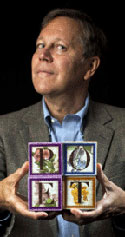Voices
What they're saying at the Stanford Graduate School of Business
A digest of speeches, blogs, videos, and essays from the GSB community.
 Value Added for Employees
Value Added for Employees
"[Money is] a motivator, but it's not the motivator. As employees, we often want three things from our employers:
- The freedom to create value
- The feeling of being valued
- The fulfillment of doing work that aligns with our values.
Employers never promise these things explicitly, but we can look for them in our current organizations or in new organizations when we make career choices — and as entrepreneurs, we can seek to create them for our own employees."
—Jullien Gordon, MBA/MA Education '07, writing for the Young Entrepreneur Council in Business Insider. Gordon is a personal and professional development consultant.
 Company Values Inspire Employee Loyalty
Company Values Inspire Employee Loyalty
"Our philosophy has been that helping our employees live out their lives according to their values is a tremendous culture builder internally. … We hear this particularly when we're recruiting. Students will politely ask a question about strategy, but then they'll get to this stuff right away. They'll say 'Tell me about the company values, and tell me about how you're engaging in the community, and tell me about your sustainability policies.'"
—Ken Powell, MBA '79, in an interview by Corporate Responsibility. Powell, pictured on the cover of the magazine, is chairman and CEO of General Mills.
 Advice for Budding Social Entrepreneurs
Advice for Budding Social Entrepreneurs
"Solving major global challenges like poverty requires innovation — breakthrough ideas that can fundamentally change how the world works. But innovation means the risk of failure, the fears that can keep people from acting on great ideas. The world needs innovation. So before you embark, look at failure. Look at it hard. And then do it anyway."
—Yasmina Zaidman, MBA '03, in an interview for Fast Company's "30-Second MBA." Zaidman is communications director of the Acumen Fund, the "generous business" founded in 2001 by Jacqueline Novogratz, MBA '91, which invests in businesses that serve low-income people.
 How Is a Submarine Like a Startup?
How Is a Submarine Like a Startup?
"[Working on a submarine] seems radically different than working in Silicon Valley, but it actually has a lot in common. Submarines are highly stressful, engineering-focused environments. You're making a lot of decisions based on very limited information. In many ways, it feels a lot like a startup, except now I see sunlight and work in SoMa and am much happier. In terms of stress, coming to periscope depth in the middle of the night in a shipping lane is much more stressful than fundraising or figuring out acquisition metrics."
—Roy Gilbert, MBA '02, in an interview in Fast Company. Gilbert, a graduate of the U.S. Naval Academy, served four years on a nuclear submarine and once spent three-and-a-half months submerged. Gilbert is CEO of Grockit, a 3-year-old online test prep company.
 Companies Redirect Resources in Developing Countries
Companies Redirect Resources in Developing Countries
"What companies are doing is thinking harder about how they use their resources. It's less about writing a check and more about using the competence of the organization. In India, some years ago, if I met business leaders, they would be embarrassed if I mentioned what Save the Children did in India. People would want to walk away from me at cocktail parties. The conversation was all about India rising. It was all about changing the brand of India from a poor country to a wealthy and successful country. But now people are prepared to come forward and have that conversation."
—Jasmine Whitbread, SEP '98, CEO of Save the Children International, in an interview in Forbes.
 Tale of a Road Warrior
Tale of a Road Warrior
"In Asia the boundary between professional and personal space is much more blurred. In the U.S., you work and then you go home and it's your time. Here, people will call your cell phone 24/7. I make myself available. It's how business gets done. … The only time I'm not wired is while flying. Being on a plane is my sanctuary. I'm thinking about getting Rosetta Stone software for my flights. I have a secret dream of learning Spanish — because at some point I want to live in San Sebastián or Buenos Aires."
—Wei Hopeman, MBA '01, interviewed by Fortune for its "Road Warrior" series. Based in Shanghai, Hopeman is head of Citigroup's Citi Ventures in Asia and regularly connects by phone or plane with company headquarters in New York. "Wherever I am, my day usually ends at 7 p.m. I relax for a few hours, then begin again. … I'm pretty good at sleeping in three-hour chunks," she told the magazine.
 To Meet Goals, Motivate Employees
To Meet Goals, Motivate Employees
"Goals on paper accomplish nothing. Motivated missionaries change the world. That may sound awfully crunchy-Northern-Californian to you, but really, is there any other way a great company has ever been built?"
—Jessica Herrin, MBA Class of 1999, writing in Inc., explains "how you can make your employees motivated missionaries." Herrin is founder and CEO of Stella & Dot. She cofounded WeddingChannel.com.
Regulations Burden Pharmaceutical Innovation
"I think you have to be very courageous to remain committed to R&D and to patient well-being in the current economic and healthcare climate. … The increasing number of regulatory and market access barriers to develop and commercialize innovative medicines … place an unfair burden on the industry and particularly on medium-sized R&D-based companies such as Almirall. According to Tufts University, the current cost of developing a successful new medicine is estimated to be at $1.3 billion, more than the total Almirall sales in one year!"
—Carlos Gallardo, MBA '02, in an interview in InPharm. Gallardo is managing director, UK and Ireland, of the international pharmaceutical company Almirall.
 Successful Startup Reflects the Power of an Idea
Successful Startup Reflects the Power of an Idea
"I had found a specific problem that engaged my passions and identified the common denominator that affects everyone from awkward girls in rural India to future CEOs in Silicon Valley. … I tried to get myself excited about other ideas. I talked to others about things that excited them, so that I might absorb some of their enthusiasm. But as much as I did this, I kept coming back to my idea. I couldn't not think about it. And that's how I knew it was the right idea. And thus Piazza was born."
—Pooja Sankar, MBA '10, blogging on Women 2.0. Sankar is founder of Piazza, an online platform that brings people together to solve problems. In its first year, Piazza served 100,000 college students and teachers around the world. The company announced $6 million in venture funding in January.
 Fed Banker Calls for End to "Survival of the Fattest"
Fed Banker Calls for End to "Survival of the Fattest"
"Just as health authorities in the United States are waging a campaign against the plague of obesity, banking regulators must do the same with regard to oversized banks that undermine the nation's financial health and are a potential threat to economic stability. … Ultimately, we should move to end too big to fail and the apparatus of bailouts and do so well before bankers lose their memory of the recent crisis and embark on another round of excessive risk taking. Only then will we have a financial system fit and proper for servicing an economy as dynamic as that of the United States."
—Richard W. Fisher, MBA '75, speaking before a Columbia University audience in November 2011. Fisher is president and CEO of the Federal Reserve Bank of Dallas.
- More: Stanford Business visited the outspoken banker at his office in Dallas.
 Private Equity Veteran Is Bullish on the Business
Private Equity Veteran Is Bullish on the Business
"There's so much [private equity] money out there that return expectations are lower than they used to be. That's just from all this competition bidding the prices up. It's like a bond. The higher the price, the lower the return. … [But] it's still a great business. We still can deliver good returns. It's just more competitive. The way the stock market performs, it makes our job easier. They're not a very tough standard to beat."
—Carl Thoma, MBA '73, in an interview by The Deal magazine. Thoma has been working in private equity investment in Chicago since 1974. He is currently a managing partner of Thoma Bravo.
- More: In 2002, Carl and Marilynn Thoma, MBA '74, endowed the GSB’s Thoma Chair, held by Hau Lee, an expert in supply chain management.
 Former Military Officer Challenged to "Change the World"
Former Military Officer Challenged to "Change the World"
"As I begin life outside of the military, I am faced with a constant inner struggle. Having been in Iraq during the surge and studied at Stanford, where we are challenged to 'change the world,' the projects of the private sector often feel uninspiring. The experience of [war] has taught me that more important than the size of the impact is where you have it. … I need to do something [my fallen West Point classmates] would be proud of, something worthy of their sacrifice."
—Jim Wilson, MBA '11, writing for the New York Times blog,"At War," on Veterans Day, 2011. A West Point graduate, Wilson served in Pakistan, Iraq, and Korea before enrolling at the GSB.
 Looking for Diversity in Silicon Valley
Looking for Diversity in Silicon Valley
"There's one date I keep focusing on, the year 2040. That's the year underrepresented minorities will … be the majority. And if that's the case, we need to start thinking about putting folks—blacks and Hispanics, among others—in positions of leadership and/or leading companies toward that goal and that year. The reason I say that is now you're going to have to start building products that appeal to a broader kind of consumer base. If we don't do that, we'll be missing the boat in a very big way."
—Tristan Walker, MBA '10, appearing on "The New Promised Land: Silicon Valley,"the fourth installment of CNN's Black in America series. Walker, director of business development for Foursquare, notes that "there aren't many folks who look like me" in the executive suites of the Valley or the VIP boxes at Candlestick Park, a situation he thinks will change.
- More: Walker joined Foursquare in 2009 when it had only three other employees, including its two cofounders. By September 2011, the company had 85.
 Mature Companies Lose Creativity
Mature Companies Lose Creativity
"By the time I got reasonably high up in management, I was the one person who had kind of kept the creative side alive. This is the dilemma of American corporations: They don't know how to deal with creative thinkers. Most American companies are created by slightly wild, visionary people that the company would never hire 50 years later."
—Dana Gioia, MBA '77, in an interview by the Los Angeles Times. A former marketing executive and a lifetime poet, Gioia chaired the National Endowment for the Arts for two terms and is currently the Judge Widney Professor of Poetry and Public Culture at the University of Southern California.
More: In 2005, Stanford Business went "On the Road with Dana Gioia," then the NEA chair.
 Fans of Solar Are Everywhere Under the Sun
Fans of Solar Are Everywhere Under the Sun
"Our customer base isn't just people saying, 'I'm an environmentalist, I'm in my Birkenstocks, I went to Woodstock.' Solar is a bipartisan technology. Republicans like solar, conservatives like solar. Over 30% of our customers are veterans. There's something very American about being able to produce power on your own rooftop."
—Lynn Jurich, MBA '07, in an interview with Fast Company. Jurich and Edward Fenster, also MBA '07, cofounded SunRun, which leases solar panels to homeowners. The company launched its first solar financing plan in 2007; it now has 14,000 customers in nine states.

 Power Exacts a Price
Power Exacts a Price Leadership Must Come from Managers
Leadership Must Come from Managers
 — Jason Thomas, MBA '00, writing for CNN Opinion. Thomas is chief investment officer of Aspiriant, a fee-only wealth management firm with offices in San Francisco and Los Angeles.
— Jason Thomas, MBA '00, writing for CNN Opinion. Thomas is chief investment officer of Aspiriant, a fee-only wealth management firm with offices in San Francisco and Los Angeles.